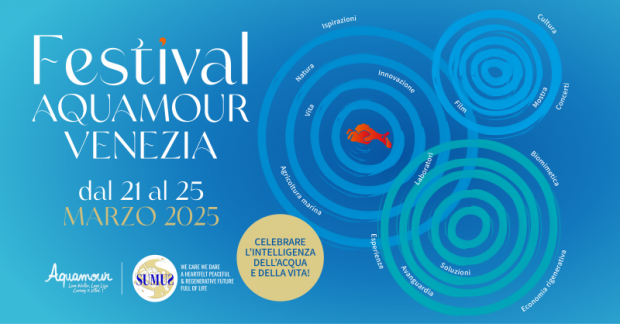Aquamour: Water as the Key to a Sustainable Future
Rebecca Basso
3/31/20254 min read


From March 21 to 25, 2025, Venice hosted the first edition of Aquamour, a festival dedicated to water in all its forms—an innovative event that transformed the Serenissima into an international crossroads of science, art, and sustainability. Organized by the SUMus Venezia association, founded by Hélène Molinari, the event turned the lagoon city into a European center for aquatic biomimicry, promoting a sustainable city model inspired by the intelligence of marine ecosystems and encouraging a new way of thinking about humanity’s relationship with water.
Aquamour is much more than just a cultural event; it is a true manifesto for the future of Venice. A city historically shaped by water, Venice is not merely a spectacular setting but also a living laboratory of innovation and resilience. The festival is part of the "Venice Aqua Valley" project, an ambitious initiative aimed at making Venice the world's leading center for research and development in sustainable water management.
SUMus Venezia and the Blue Renaissance
Hélène Molinari strongly emphasized the urgency of global change: "After COVID, I realized that the world was heading in the wrong direction. We are exceeding six of the nine planetary boundaries. But there is good news: we can change. Nature has existed for over 4 billion years, while we have been here for only 300,000 years. If we start repairing and restoring with intelligence and heart, nature will do the rest."
SUMus introduced an innovative concept: the Venetian "Do Tank," a collective of citizens, associations, and businesses that goes beyond theoretical discussion and directly engages in concrete sustainability projects. For this reason, the association placed systemic regeneration at the heart of the festival, proposing a new development paradigm based on three fundamental pillars:
● Human – Promoting individual and collective well-being by developing awareness and wisdom for a more harmonious society.
● Earth – Ensuring food autonomy and ecosystem health through regenerative agricultural practices.
● Water – Creating an academic, economic, and artistic ecosystem based on the "treasures of water," drawing inspiration from biomimicry to unlock new opportunities for sustainable development.
What is Biomimicry? Biomimicry refers to technologies inspired by solutions adopted by plants and animals in nature—learning from natural intelligence to repair the planet and improve both our own conditions and those of Earth. Events and Highlights of the Aquamour Festival Beyond panels and conferences, the festival featured numerous artistic and cultural events, including:
● AcquaHappening – Four days of meetings, performances, and workshops dedicated to water as an element of connection.
● AcquaConcert – Two special concerts: the first at Teatro Goldoni with the group Monte Bello, and the second at Conservatorio Benedetto Marcello, featuring cellist Luca Franzetti and Iranian soprano Forooz Razvi.
● AcquaFilms – A film series on aquatic themes at Cinema Rossini, followed by debates.
The Role of Polis: Universities as Engines of Change
The connection between Venice and the festival is strengthened by collaborations with academic and cultural institutions. Ca' Foscari University Rector Tiziana Lippiello inaugurated the event, emphasizing the importance of student involvement in projects of this scale: "We are proud to be part of the festival. It's great to see students being so proactive." Simone Rizzo, president of Polis, reinforced the importance of creating opportunities for young people: "The real issue is creating windows of possibility. If we are aware of the spaces where we can accelerate our ideas, then change happens."
On March 25, Polis had the opportunity to present various projects at Ca’ Cappello, discussing the relationship between academia, youth, and the city of Venice. They introduced a series of concrete initiatives for the sustainable transformation of the lagoon, including five standout projects:
● Digital Mapping of Venice's Socio-Political Communities – Led by Amerigo Rizzone, Pietro Zanotelli, Diego Cusan, and Vasco Guccione, this project aims to create an interactive platform connecting citizens with local politics and social initiatives. The goal is to make the city's governance more transparent and accessible.
● Dialogue at the Galleries – An initiative by Laura Cerutti, Giorgia Del Fabbro, Matilde Riccardi, and Dr. Nicolaci, offering thematic educational paths for students at the Gallerie dell'Accademia, designed to bring young people closer to Venetian art and history in an innovative way.
● Scientific Solutions for the Environment – Efren Trevisan, a PhD from Sapienza University, presented a project focused on restoring aquatic ecosystems through the use of geo-bacteria, microorganisms capable of purifying water without disrupting the natural balance.
● Art as a Tool for Environmental Awareness – Edoardo Spata from the Academy of Fine Arts explored the theme of "The New" through the works of Giorgio Calò, highlighting the role of art in fostering a more sustainable and socially responsible approach to the environment.
● Venice and the Scuole Piccole – Irene Calderoni, artistic director of Scuola Piccola Zattere, presented a vision of Venice as a city of art and community, inspired by the historic Scuole Piccole, egalitarian institutions that promoted culture and inclusion.
A New Beginning for Venice
The Aquamour Festival was not just a moment of reflection but a starting point for a new approach to sustainability. With its rich history and inherent fragility, Venice can become the symbol of global transformation. Water, once seen as a threat, is now being reimagined as a resource to be valued—a key to building a more just, sustainable, and innovative future. In this journey, the contribution of young people and universities will be crucial. As demonstrated by Polis Venezia, true change always begins with the new generations.
© 2024. All rights reserved.
Contacts
segreteria@polisvenezia.com
